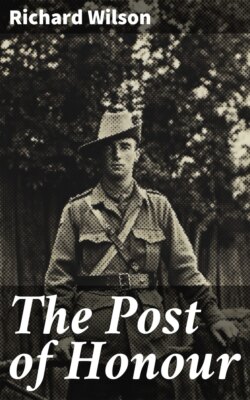Читать книгу The Post of Honour - Richard Wilson - Страница 4
На сайте Литреса книга снята с продажи.
INTRODUCTION
ОглавлениеTable of Contents
It is often said that “the post of danger is the post of honour.” The post of danger is given to the bravest, and the knowledge that much depends upon him often nerves him to the doing of dauntless deeds.
The record of valour which the Great War gave to history is the finest in the memory of mankind. The knowledge of science which men had won made fighting much more terrible than it had ever been before; but still the post of danger was eagerly sought by those men who could echo the words of King Harry of England:
“If it be a sin to covet honour,
I am the most offending soul alive.”
Many brave deeds were also done in that great struggle by men who had no idea that they were heroes. They just did their duty as it came along without any thought of honour or fame. They were like Jack Cornwell, the boy hero of the Battle of Jutland. They were “just carrying on.”
These deeds of daring were done by men, and even by women, in the armies of all the fighters—and among the Germans too. Each army had its ever-increasing band of heroes, until the numbers seemed to pass beyond counting. It was a sad world during that war time, but it was a brave world as well.
Among the bravest were the soldiers of Britain. This does not mean only the soldiers of the British Isles. It means the soldiers of the British Empire. It includes men from England, Wales, Scotland, Ireland, Canada, Australia, New Zealand, South Africa, and the islands of the sea. It also includes natives of India, for many brave deeds were done by the men from that far-off land, who came so willingly to help their Emperor who was also our King.
What is a brave deed? Was it brave of Robert Clive to climb to the top of Market Drayton steeple in his boyhood? We smile at the story, but somehow we feel that the act was not what we should call brave.
It was daring, fearless, and a fine test of steady nerve. But it was not brave or heroic. Why? What was wanting to make it a matter for praise? The call of duty, I think, and I imagine that you will agree with me.
The deed was not done in the course of duty or to help some one in peril. If the boy’s daring had saved the life of a child we should hail him as a hero. A brave deed is a deed done in forgetfulness of self and at the call of duty.
In the Great War thousands of such deeds were done which were never reported. Only now and again a heroic action was brought to the notice of those whose business it was to set it down and to ask the King for a reward. No story of the Great War, however long, will ever tell of all the heroes.
The stories which are collected in this little book are only isolated instances. They are types or examples. But I have tried to tell of those which have some special lesson to teach us. Each of the heroes whose story is told here had a message for all those who were to follow them. It will be well to ask at the end of each story what this lesson was.
One word more, before we begin our stories. It is not true that a brave man feels no fear. Some of the bravest deeds on record have been done in secret fear and trembling.
A story is told of a great leader who always inwardly felt great fear when he was going into action. One day when this dread came upon him, he said to himself, “Ah, you are trembling, are you? But you would tremble more if you knew where I was going to take you to-day.”
Such a man is the bravest of the brave; for he must conquer himself as well as the enemy.
